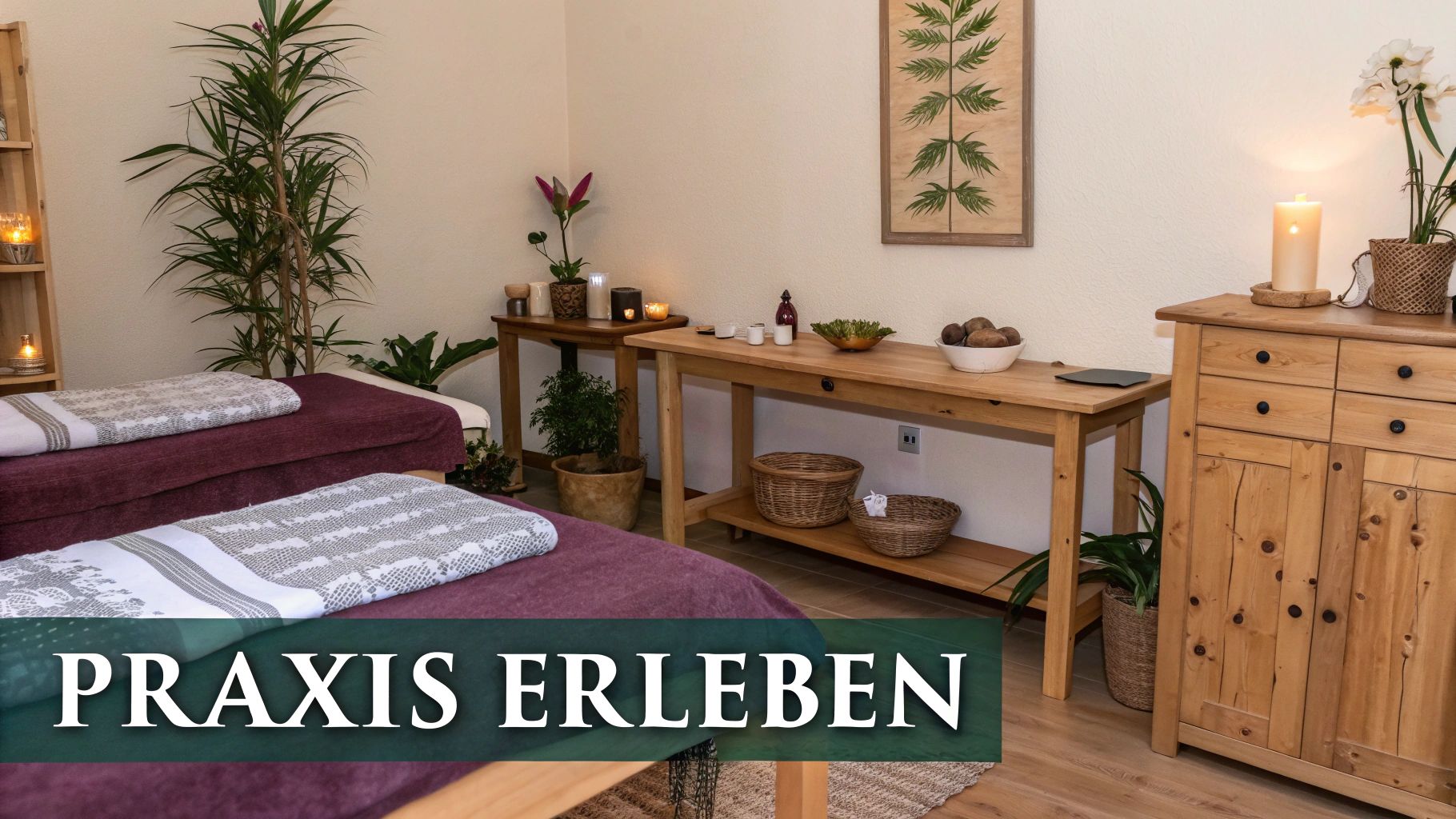The Naturopathic Profession: Between Tradition and Modernity

The naturopathic profession exerts a special fascination through the combination of traditional naturopathy and modern insights. But what does it mean to work as a naturopathic practitioner today?
This profession encompasses more than just the application of alternative healing methods. It is about individual patient care, understanding complex relationships within the human body, and the development of holistic therapies.
The Role of the Naturopathic Practitioner in the German Healthcare System
The naturopathic practitioner has a unique position in the German healthcare system. They expand conventional medical offerings through naturopathic methods. This offers patients an alternative perspective on health and illness.
This requires sound knowledge of both conventional medical principles and the various therapeutic approaches of naturopathy. The demand for naturopathic practitioners is high. Over 128,000 patients visit naturopathic practitioners daily in Germany.
This underscores the importance of this profession in healthcare. In Germany, an estimated 47,000 naturopathic practitionersare working. Here you will find more detailed statistics. This shows the increasing interest in complementary medicine approaches.
The daily work of a naturopathic practitioner
The daily work of a naturopathic practitioner is varied and diverse. From anamnesis and diagnosis to therapy planning and the implementation of treatments, they individually accompany their patients on their path to health.
Various naturopathic methods are used. For a detailed overview of various topics related to naturopathy, we recommend the following: Our blog posts. The specific design of everyday work naturally depends on the respective specialization of the naturopathic practitioner.
Tradition meets Modernity: The Challenges of the Profession
The naturopathic profession faces the challenge of uniting tradition and modernity. It is important to preserve the knowledge of ancient healing methods while remaining open to new scientific findings.
This requires continuous professional development and the ability to think critically and integrate different approaches. The naturopathic profession offers the opportunity to accompany people on their path to greater well-being and to make a positive contribution to the health of society.
What you really need to bring

Do you dream of becoming a naturopathic practitioner? A wonderful goal! In addition to the formal requirements, there are some important personal qualities that are crucial for success in this profession. In this section, we highlight the skills and character traits that will truly help you on your path to becoming a naturopathic practitioner.
Formal Requirements: The first step to becoming a naturopathic practitioner
First, the obvious: To become a naturopathic practitioner, you must successfully pass the naturopathic practitioner exam. The formal requirements for this are a minimum age of 25 and a secondary school diploma. Formal training in a medical field is not required, which is a frequent topic of discussion. Compared to other medical professions, which often require years of training, this may seem unusual. More information about the Heilpraktiker exam can be found here. The exam, however, is only the first step on your path.
Personal Qualities: The Foundation for Your Success
More important than the formal requirements are your personal qualities. Empathy is fundamental. You must be able to empathize with your patients and treat them with sensitivity. Communication skills also play a major role. You should be able to explain complex medical issues in an understandable way and respond to the individual needs of your patients.
Resilience and Willingness to Learn: Continuous Growth in the Profession
The path to becoming a Heilpraktiker and the subsequent practice of the profession are demanding. Resilience is therefore important to meet the challenges of everyday practice. Naturopathy is a constantly evolving field. Willingness to learn is essential to keep your knowledge up-to-date and to integrate new therapeutic approaches.
Self-organization and entrepreneurial thinking: The key to your own practice
As a naturopathic practitioner, you are often self-employed. Self-organization is therefore necessary to run your practice efficiently and coordinate appointments. Entrepreneurial thinking and basic marketing knowledge are helpful to successfully establish your practice and attract patients.
Self-reflection: The path to authenticity in dealing with patients
The profession of naturopathic practitioner requires constant self-reflection. Only in this way can you recognize your own strengths and weaknesses and interact authentically with your patients. This process supports you in finding your professional identity and shaping your practice successfully.
Finding the right training – beyond the advertising

The dream of becoming a naturopathic practitioner – a heartfelt desire for many. But the path there begins with an important question: Which training is the right one? The multitude of offers can quickly become confusing. How do you find the right school that meets your individual needs and learning style? This section offers guidance and helps you to question the advertising promises and find the optimal training.
Training formats under scrutiny
In Germany, naturopathic practitioner training is not state-regulated and is in the hands of private schools. Choosing the right institution is therefore crucial. An overview of the common training formats:
-
Full-time programs: They enable intensive learning in a compressed timeframe and are ideal for those who want to quickly enter the profession.
-
Part-time courses: These offer flexible learning alongside your job and are particularly suitable if you wish to continue working while training.
-
Online offerings: Learn independently of location and with time flexibility. Online courses offer maximum freedom and independence.
Each format has its specific advantages and disadvantages. The optimal choice depends on your personal circumstances and your preferred learning method.
What matters when choosing a school
Colorful brochures and flowery marketing promises aren't everything. When choosing a naturopathic school, pay attention to the following quality criteria:
-
Instructor Qualification: Are experienced naturopathic practitioners or physicians teaching?
-
Teaching Methods: Are various learning methods, such as case studies and practical exercises, offered?
-
Practical Relevance: Does the school offer sufficient opportunities to apply the acquired knowledge in practice?
-
Success Rate: How well do the school's graduates perform on the official medical examination?
-
Alumni Network: Is there a network of former students that can support career entry?
Comparing different schools based on these criteria will help you make the right decision.
To simplify your decision, please find a comparison table below:
Training Options Comparison
Comparison of Different Training Models for Prospective Naturopathic Practitioners
| Training Type | Duration | Cost | Advantages | Disadvantages |
|---|---|---|---|---|
| Full-time Program | approx. 1 year | high | fast, intensive | less flexible |
| Part-time | approx. 2-3 years | medium | flexible, part-time compatible | time-consuming |
| Online | variable | low - high | maximum flexibility | requires high self-discipline |
This table provides an initial overview. Please note that the actual costs and duration may vary depending on the provider. Therefore, always inquire directly with the respective schools.
Weighing Costs and Benefits
Training costs vary considerably. Compare not only the prices, but also the services offered. What do you get for your money? A low price may be tempting, but make sure that the quality of the training does not suffer. The training to become a Heilpraktiker (alternative practitioner) is not uniformly regulated in Germany and is not state-regulated. Numerous private schools offer different preparation options, from intensive courses to multi-year full-time studies. More information on Heilpraktiker training can be found here. Interestingly, 31 percent of alternative practitioners have a university degree, while 63 percent have completed vocational training.
Use testimonials
Exchanging information with graduates is invaluable. What tips would they give you? What helped them most in their training? Talk to former students of different schools and benefit from their experiences. This way you gain realistic insights and can make the right decision for you. Because the best training is the one that optimally prepares you for the exam and everyday professional life.
Conquering the exam: Strategies instead of panic

The alternative practitioner exam is a step that is associated with nervousness and exam anxiety for many prospective alternative practitioners. Good and structured preparation is therefore essential for success. This section shows you which strategies you can use to confidently master the exam. It's not just about rote memorization of medical knowledge, but also about the right approach to the exam situation itself.
Successful learning: More than just factual knowledge
How do successful candidates prepare optimally? They don't just focus on memorizing facts, but emphasize understanding the connections. They use various learning methods, such as Mindmaps, Flashcards and Group study, to effectively process and internalize the learning material. Repetition and regular practice are also important factors. Additional tips and suggestions can be found here: How to master.... This way you create a solid foundation for the exam.
The examination in detail: Written and oral
The Heilpraktiker examination consists of a written and an oral part. In the written part, 60 multiple-choice questions must be answered. At least 75 percent of the questions must be answered correctly to pass. This part of the examination serves to protect public health and ensures that Heilpraktikers do not pose a risk. The failure rate varies from state to state and can be up to 70 percent in some cases. More detailed statistics on the failure rate can be found here. In the oral examination, your practical skills and your understanding of the application of the acquired knowledge are tested.
Overcoming Exam Anxiety: Staying Calm Under Pressure
Exam anxiety is a widespread phenomenon and completely normal, but it can negatively impact performance. Learn relaxation techniques such as breathing exercises or progressive muscle relaxationto stay calm even in stressful exam situations. A positive attitude and visualization techniques, where you imagine yourself succeeding in the exam, can also help reduce your nervousness and boost your confidence. Focus on your strengths.
The Oral Exam: Communication is Key
In the oral exam, not only your expertise is required, but also your communication skills. Practice patient communication, formulating diagnoses , and creating treatment plans. Don't hesitate to ask questions if you don't understand something, and demonstrate your willingness to learn. A genuine and confident demeanor will help you convince the examiners.
Time Management: Learn effectively and make the most of your time
A realistic study plan is essential to master the extensive exam material. Structure the material into smaller learning units and schedule regular breaks to maintain your concentration. Prioritize the topics according to their relevance for the exam and focus on your weaknesses. Use various learning resources, such as textbooks, online courses and exam simulations, to optimally prepare for the exam. Good time management helps you keep track of everything and use your study time effectively.
From Qualification to Successful Practice
Passing the alternative practitioner exam is a great success! But the path to your own practice isn't over yet. Strategic action and entrepreneurial thinking are now required. This section guides you through the first steps towards self-employment with practical tips and concrete instructions. Good preparation for the challenges of everyday practice is crucial. Resilience plays an important role. Read more about how you can strengthen your resilience: How to become more resilient.
Business Plan: The Foundation of Your Practice
A solid business plan is the foundation of your successful practice launch. It helps you define goals, analyze your target audience, and plan financial resources. A well-structured business plan includes the following points:
- Market Analysis: What is the demand for alternative practitioners in your region? What competition exists?
- Services: Which therapy methods do you offer? What is your unique selling proposition?
- Marketing Strategy: How will you acquire patients? Which marketing channels will you use?
- Financial Planning: What costs will be incurred? What is your projected revenue?
Location Selection: The right place for your practice
The choice of location significantly influences the success of your practice. Therefore, pay attention to the following aspects:
- Accessibility: Is your practice easily accessible by public transport? Is there sufficient parking?
- Environment: Does the surrounding area suit your target group?
- Costs: What are the rental and utility costs?
To give you an overview of the costs involved, you will find a table here with typical investments for setting up a naturopathic practice.
The following table gives you an overview of typical investments involved in setting up a naturopathic practice:
| Cost Item | Minimum Amount (€) | Average (€) | One-time/Recurring |
|---|---|---|---|
| Practice Furnishing | 5.000 | 10. 000 | One-time |
| Marketing & Advertising | 500 | 2.000 | Recurring |
| Rent | 500 | 1.000 | Recurring |
| Insurance | 200 | 500 | Recurring |
| Software & Hardware | 1.000 | 3.000 | One-time/Recurring |
| Training | 500 | 1.000 | Recurring |
| Consumables | 100 | 300 | Recurring |
As you can see, costs can vary. Therefore, plan carefully and factor in a buffer for unexpected expenses.
Patient Acquisition: Building Visibility and Trust
To acquire patients, you need to promote your practice and build trust. The following strategies can help you:
- Online Presence: Create a professional website and use social media platforms.
- Networking: Cooperate with doctors and other health practitioners.
- Referrals: Ask satisfied patients for referrals.
Pricing: Ensuring Financial Stability
Realistic pricing is crucial for your financial stability. Analyze the prices of other health practitioners in your region and calculate your costs carefully.
Alternative Entry Models: Gradual Steps Towards Self-Employment
Taking the step into full self-employment can be challenging. Alternative entry models offer a smoother transition:
- Joint Practice: Share practice rooms and costs with other health practitioners.
- Part-time Work: Start your practice part-time.
Legal Aspects: Acting Legally Compliant
Observe the legal requirements for health practitioners, such as the German Regulation of Health Practitioners (Heilpraktikerverordnung) and the German Law on Non-Medical Practitioners (Heilpraktikergesetz). Consulting a specialized lawyer is recommended.
Professional Work: Convince from the Start
A professional appearance creates trust with your patients. Pay attention to the following points:
- Professional Practice Environment: Design your practice rooms to be appealing and functional.
- Clear Communication: Inform your patients clearly about your services and prices.
- Continuing Education: Always stay up-to-date on the latest developments in natural medicine.
Establishing a successful natural health practice requires time, effort, and dedication. With thoughtful planning, solid training, and a good dose of resilience, you can achieve your goals and support people on their path to health.
Shape Your Career: Specialization as a Success Factor
After passing the exam and opening your practice, the exciting part of your journey as a natural health practitioner begins. In an increasingly competitive environment, specialization is the key to success. This section supports you in discovering your niche in natural medicine and positioning yourself as an expert.
Finding the right direction
Natural medicine offers a diverse range of therapeutic approaches. From homeopathy to Traditional Chinese Medicine (TCM) to osteopathy and psychotherapy – the possibilities are wide-ranging. But which direction suits you best?
Consider the following points when choosing your specialization:
- Interests and strengths: Which therapy forms inspire you? What are your talents and skills?
- Market needs: Which therapies are in demand in your region? Where is there a need for specialized practitioners?
- Personal niche: Combining your interests with market needs helps you define your unique niche.
Learn from success stories
Many experienced practitioners have built their success through specialization. Their stories can inspire you and show how strengths and interests harmonize with market needs. This is how you find your individual path to success.
Further Training and Market Potential
For every therapy direction, there are specific further training opportunities. Find out about training paths, certifications, and advanced training courses. Keep in mind the market potential and future prospects of the respective direction.
Examples of specializations within naturopathy:
- Homeopathy: Classical homeopathy, clinical homeopathy
- TCM: Acupuncture, Tuina, herbal medicine
- Osteopathy: Parietal, visceral and craniosacral osteopathy
- Psychotherapy: Behavioral therapy, talk therapy
An overview of various therapy forms and further training options can be found here: Overview of therapy forms.
Continuous Learning
Natural medicine is constantly evolving. Regular professional development through specialist conferences, seminars, and workshops is therefore essential to keep your knowledge up-to-date and consolidate your expertise. This allows you to offer your patients the best possible treatment.
Visibility as an Expert
Clear positioning is crucial to establishing yourself as an expert in your area of specialization. Define your target audience and communicate your expertise clearly. Use your website, social media, and other channels to present your specialization and address potential patients.
Actively Shape Your Career
As a naturopathic practitioner, you have the opportunity to actively steer your career. With a specialization, you combine your passion for natural medicine with economic success. Find your niche, continuously educate yourself, and position yourself as an expert. This way, you establish a successful practice and guide your patients on their path to greater well-being.
Interested in the world of Animus Medicus? Be inspired by our anatomical artworks: Animus Medicus